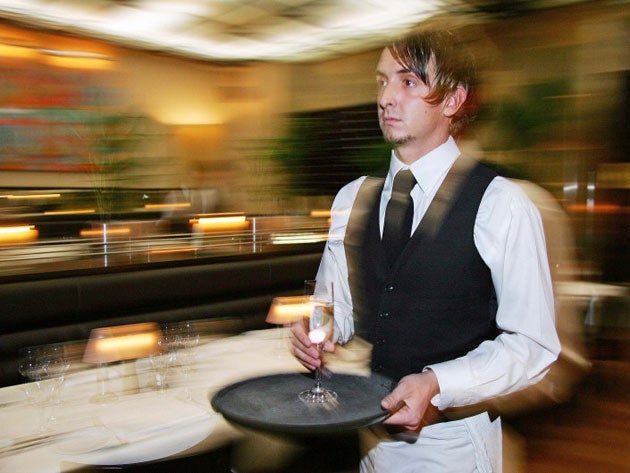Victory for fair tips campaign as ministers act

The Government is to outlaw the practice under which restaurants pay staff less than the national minimum wage and make up the rest in tips, following The Independent's "fair tips, fair pay" campaign.
Ministers will use the 10th anniversary of the National Minimum Wage Act on Thursday to announce they will make it illegal for restaurants to deny staff the minimum wage on the grounds that tips or service charges take them over the £5.52p an hour rate. The move was discussed in private talks with trade unions and Labour grassroots representatives yesterday to draw up ideas for the party's next election manifesto. It will be implemented as soon as the Government can push the necessary regulations through parliament, probably in a matter of months.
Labour's national policy forum agreed to close a loophole left by the 1998 Act that allows tips processed through the employer's payroll to count towards the minimum wage. Concern was expressed at the Warwick University meeting by unions and party members about workers being paid as little as £3 or £4 an hour, on the grounds that tips would take them over the minimum.
One Labour source said: "It's a response to The Independent's excellent and persuasive campaign. This is about fairness."
John Hutton, the Business Secretary, said last night: "Customers who leave a tip in a restaurant want it to go to staff – they don't expect it to be used to subsidise owners paying the minimum wage. People see this as a basic issue of fairness. I have heard that message loud and clear from Labour Party delegates this weekend ... We have decided to change the law so tips received by serving staff must be paid on top of the national minimum wage, not as part of it."
Ministers do not intend to legislate over another goal of this paper's campaign – that all restaurants should operate a transparent policy for distributing service charges and tips to their staff and display their policy clearly on their menus. They believe it would be difficult to enforce.
But ministers will raise the issue in talks with the hospitality industry and urge it to encourage restaurants to adopt "clear and fair" tipping policies. "We want to see greater transparency," said one government source.
Unite, the trade union which has also called for the loophole to be closed, welcomed the Government's move. Len McCluskey, its assistant general secretary, said: "This is great news for the thousands of hard-working waiting staff in restaurants and cafes across the country. We now look forward to government moving swiftly to closing this loophole once and for all and ending this wages swindle by Christmas."
He added: "Well done to The Independent for backing this campaign. Workers will now get a fairer deal on their wages, but we also have a lasting legacy in the Fair Tips charter which will signpost customers to those restaurants where staff do keep the tips they've earned and fully deserve, meaning consumers really can tip with confidence."
The Italian chef Aldo Zilli welcomed the news: "The fact that they [in government] are doing something about people that are paying staff minimum wage including tips – that's welcome, that's fantastic." He said further reforms were needed to separate tips from bills. "It needs to be made formal that service charge is now included in the price – like bread or VAT – and then if someone wants to give a waiter a fiver on top, they can."
The Independent's campaign, launched two weeks ago, won the support of 89 MPs from all parties. They signed a Commons motion tabled by the Labour MP Michael Connarty, who has fought a long campaign on the issue.
At the policy forum, ministers also promised tougher enforcement of the minimum wage, including higher penalties for firms paying their workers less. They pledged to extend the full adult rate, which currently kicks in at the age of 22, to 21-year-olds. It will ask the Low Pay Commission to consider whether apprentices should receive a legal minimum.
Ministers will extend paternity leave to allow fathers to spend more time with their babies and extend the right to unpaid leave for parents from those with children aged five to those whose children are up to 16.
Union calls to relax laws curbing industrial action were rejected but unions warned they would return to their demands at another meeting of the 184-member forum before the election. The conference voted for a lowering of the voting age to 16, a fully-elected House of Lords, and backed plans for a million "green collar" jobs through expansion of renewable energy and nuclear power.
Join our commenting forum
Join thought-provoking conversations, follow other Independent readers and see their replies
Comments
Bookmark popover
Removed from bookmarks